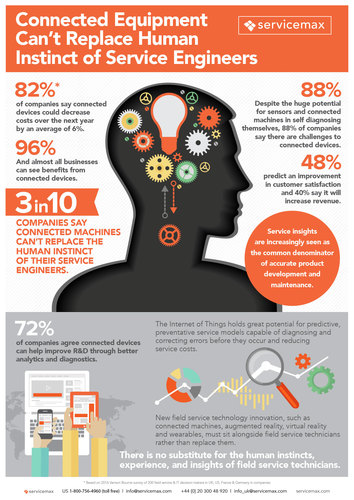Connected Equipment Will Reduce Service Costs By 6%, But Businesses Say It Can’t Replace Human Instinct of Service Engineers
6 July 2016 – London, U.K. – Businesses say connected equipment could decrease service costs by an average of 6% over the next year, but three in ten companies say connected machines can’t replace the human instinct of their service engineers, according to a new independent study from Vanson Bourne, commissioned by ServiceMax, the leader in cloud-based field service management solutions.
Vanson Bourne surveyed 200 IT and field service decision makers in US, UK, France and Germany in companies of all sizes with customer field service departments. Despite the huge potential for sensors and connected machines in self diagnosing themselves, 88% of companies say there are challenges to connected devices. And almost a third (30%) don’t believe sensors can replace the human insights and instincts of their service engineers.
“While the Internet of Things holds great potential for predictive, preventative service models capable of diagnosing and correcting errors before they occur and reducing service costs, there is no substitute for the human instincts, experience, and insights of field service technicians,” said Spencer Earp, Vice President EMEA for ServiceMax.
The report found that 82% of companies say connected devices could decrease costs over the next year by an average of 6%. And almost all businesses (96%) could see benefits from connected devices, with 48% citing an improvement in customer satisfaction and 40% saying increased revenue.
“We’re seeing increased interest in a range of new technologies from IoT to augmented reality, virtual reality and wearables, but it must sit alongside field service technicians rather than replace them,” added Earp. “One of the most interesting trends we are seeing is using connected equipment to provide insights into things such as field service technician safety, as well as a feedback loop for R&D product design. Service insights are increasingly seen as the common denominator of accurate product development and maintenance, and something our customers are already embracing.”
Prior to IoT, R&D teams relied on interpretation and anecdotal input from field service engineers to get a full understanding of how products were faring out in the field, and service reports were arbitrary.
Post-IoT, the picture is becoming increasingly different as companies realise the ability to gain a feedback loop from service insights into design considerations.
The Vanson Bourne survey found that 72% of companies agree connected devices can help improve R&D through better analytics and diagnostics.
To download a copy of the executive summary and/or the full report findings, please click here.
About ServiceMax
ServiceMax leads the massive global industry of field service management software -- an $18 billion market worldwide. The company continues to reimagine and create solutions for the 20 million people globally who install, maintain, and repair machines across dozens of industries as the only provider of complete end-to end mobile and cloud-based technology for the sector. ServiceMax goes to every length -- from joining technicians on service calls to publishing the industry's leading online publication -- to help customers discover untapped innovation, unleash new revenue streams, drive efficiency, and most importantly delight their end-customer. To learn more, please visit www.servicemax.com.
About Vanson Bourne
Vanson Bourne is an independent specialist in market research for the technology sector. Our reputation for robust and credible research-based analysis is founded upon rigorous research principles and our ability to seek the opinions of senior decision makers across technical and business functions, in all business sectors and all major markets. For more information, visit www.vansonbourne.com.
About the report
During April 2016, research firm Vanson Bourne interviewed 100 IT decision makers and 100 field service decision makers from the US, UK, Germany and France. To qualify for the research, respondents' organisations could be from any size and sector, but the organisation had to have at least one field service engineer. The IT decision makers and field service decision makers were interviewed using an online methodology and a robust multi-level screening process was used to ensure only appropriate respondents participated in the project.
Media Contact:
Vanessa Land
Devonshire Marketing
Tel: +44 (0)7768 693779
vanessa@devonshiremarketing.com
